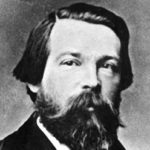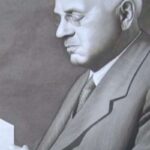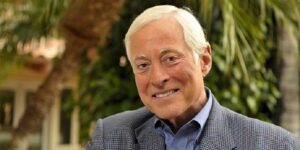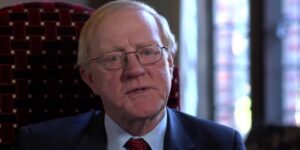Bessel van der Kolk biografie, quotes en boeken

Bessel van der Kolk is een Nederlandse psychiater en auteur, geboren op 3 mei 1943 in Den Haag, Nederland. Bessel van der Kolk staat bekend om zijn baanbrekende werk op het gebied van de impact van trauma op het lichaam, brein en geest. Hij heeft een belangrijke rol gespeeld bij het ontwikkelen van nieuwe benaderingen voor de behandeling van trauma en gerelateerde aandoeningen. Van der Kolk is daarnaast de oprichter van het Trauma Center in Brookline, Massachusetts, en heeft meerdere invloedrijke boeken en artikelen geschreven over het onderwerp trauma en geestelijke gezondheid.
De biografie van Bessel van der Kolk
Jeugd in oorlogstijd
Bessel van der Kolk werd geboren op 3 mei 1943 in Den Haag, tijdens een tumultueuze tijd waarin Duitse troepen het land bezetten. Hij kwam vanaf jongs af aan in aanraking met trauma, groeide op in het midden van de grote Nederlandse hongersnood en was omringd door Holocaust-overlevenden. Zijn eigen vader had in een Nazi-werkkamp gevangen gezeten, en de ervaringen van de familie tijdens de oorlog hadden een diepgaande invloed op het leven en werk van Van der Kolk.
Van der Kolk beschreef zijn moeder als koud en ongelukkig. Ook heeft hij onthuld dat mishandeld werd door zijn vader, die vatbaar was voor woede-uitbarstingen. Deze vroege ervaringen van trauma en misbruik zouden later het werk van Van der Kolk als psychiater en onderzoeker beïnvloeden, met name zijn focus op de impact van trauma op de hersenen, het lichaam en de geest.
Geneeskunde
Als tiener begon Van der Kolk te reizen en bracht hij tijd door in verschillende Europese landen. Hij overwoog zelfs om monnik te worden nadat hij in een Frans klooster had verbleven. Uiteindelijk koos hij voor een carrière in de geneeskunde en studeerde aan de Universiteit van Amsterdam, waar hij in 1969 zijn medische graad behaalde. Hierna vertrok hij naar de Verenigde Staten.
Na het voltooien van zijn pre-medische studies met als hoofdvak politieke wetenschappen aan de Universiteit van Hawaï in 1965, behaalde Bessel van der Kolk zijn M.D. aan de Pritzker School of Medicine, University of Chicago, in 1970.
Hij voltooide daarna zijn psychiatrische opleiding aan het Massachusetts Mental Health Center, Harvard Medical School, in 1974. Na zijn opleiding werkte Van der Kolk als directeur van Boston State Hospital en later als stafpsychiater bij de Boston Veterans Administration Outpatient Clinic.
In 1982 richtte hij het Trauma Center op in Brookline, Massachusetts, terwijl hij een junior faculteitslid was aan de Harvard Medical School.
Het gebruik van MDMA in therapie
Bessel van der Kolk heeft ook onderzoek gedaan naar het gebruik van MDMA (ook bekend als ecstasy of molly) in therapie voor PTSS door bijvoorbeeld seksueel misbruik. Hij gelooft dat de drug kan helpen bij het faciliteren van emotionele genezing en het verminderen van angst en angst bij patiënten.
Van der Kolk heeft ook voorzichtig optimisme uitgesproken over het potentiële gebruik van andere psychedelica zoals psilocybine en ayahuasca bij de behandeling van trauma.
Hij benadrukt dat er behoefte is aan zorgvuldige klinische proeven en nauwlettend toezicht op patiënten om veiligheid en werkzaamheid te garanderen. Het is niet de bedoeling dat patiënten zelf gaan experimenteren met de drugs.
Bijdragen aan de psychologie
Van der Kolk heeft een belangrijke bijdrages geleverd aan het behandelen van trauma. Hij gelooft dat het lichaam na het ervaren van een traumatische gebeurtenis opnieuw wordt afgestemd om de wereld als een gevaarlijke plek te interpreteren.
Hij was kritisch over het gebruik van exposure therapie en cognitieve gedragstherapie voor trauma, en hij gelooft hij dat trauma vooral fysiek wordt ervaren in plaats van cognitief. Daarom paste hij psychomotorische therapie toe, een techniek ontwikkeld door danser Albert Pesso die zich richt op de genezing van het lichaam.
Bessel van der Kolk stelt dat het herstellen van de verbinding tussen geest en lichaam de sleutel is tot het oplossen van trauma, in plaats van het verdoven of dissociëren van de persoon. Hij werkt samen met mensen om hun lichamelijke sensaties aan te pakken om het trauma beter te kunnen verwerken.
Naast zijn werk als therapeut is Bessel van der Kolk een productief onderzoeker. Hij heeft onderzoek gedaan naar de effectiviteit van yoga bij de behandeling van PTSS, de onderliggende mechanismen van Eye Movement Desensitization and Reprocessing (EMDR) en het gebruik van neurofeedback bij PTSS.
Het werk van van der Kolk is bekritiseerd door sommigen die vinden dat hij de neurowetenschap te simpel voorstelt om zijn claims te ondersteunen en dat zijn werk niet volledig wordt ondersteund door verder onderzoek.
Succesvolle boeken
Zijn twee meest populaire boeken geschreven over trauma en genezing zijn “The Body Keeps the Score” en “Traumatic Stress: The Effects of Overwhelming Experience on Mind, Body, and Society”.
“The Body Keeps the Score” beschrijft hoe traumatische ervaringen ons lichaam beïnvloeden en hoe we kunnen genezen door de verbinding tussen lichaam en geest te herstellen. Het tweede boek, “Traumatic Stress: The Effects of Overwhelming Experience on Mind, Body, and Society”, biedt inzicht in de oorzaken en gevolgen van trauma en beschrijft nieuwe benaderingen voor behandeling en genezing.
Deze boeken hebben bijgedragen aan een grotere bewustwording van de impact van trauma en hebben geholpen om de benadering van traumabehandeling te veranderen.
Persoonlijk leven van Bessel van der Kolk
Bessel van der Kolk is getrouwd en heeft twee kinderen. Veel meer is niet bekend over zijn persoonlijke leven. Hij is wel altijd open geweest over zijn eigen worstelingen met trauma, waaronder ervaringen van kindermishandeling en zijn eigen therapieproces.
In interviews en publieke optredens heeft hij gesproken over het belang van het erkennen en aanpakken van iemands eigen trauma als een noodzakelijke stap in het helen en werken met anderen die trauma hebben ervaren.
Bekende quotes van Bessel van der Kolk
- “As long as you keep secrets and suppress information, you are fundamentally at war with yourself.”
- “Being able to feel safe with other people is probably the single most important aspect of mental health.”
- “Healing requires a mix of acceptance and change.”
- “If we can find a way to honor the body, then we can find a way to heal.”
- “If you’ve suffered from trauma, you’re not a machine with broken parts. You’re a human being with unmet needs.”
- “If you’re not talking about trauma, you’re not talking about the essence of life.”
- “One of the most important aspects of trauma recovery is the recognition that it is a journey with a beginning, a middle, and an end.”
- “Psychotherapy is not about insight, it’s about bodily felt experience.”
- “The ability to be in the present moment is a major component of mental wellness.”
- “The body is the container for our life experiences.”
- “The body keeps the score, and it always wins.”
- “The body remembers what the mind forgets.”
- “The capacity for self-care needs to be built into the core of what we teach.”
- “The challenge of recovery is to recreate a life that honors what has been lost.”
- “The challenge of recovery is to reestablish ownership of your body and your mind–of yourself.”
- “The essence of trauma is feeling alone and unheard.”
- “The essence of trauma is that it overwhelms the brain’s ability to cope with reality. Trauma is not just an event that took place sometime in the past; it is also the imprint left by that experience on mind, brain, and body.”
- “The greatest sources of our suffering are the lies we tell ourselves.”
- “The human brain is an exquisitely sensitive instrument.”
- “The more you’re aware of your own body sensations, the more able you are to understand how you’re feeling.”
- “The most important issue facing humanity is not climate change or income inequality, but our ignorance about the workings of the human brain and body.”
- “The natural state of trauma is fragmentation.”
- “The only way to change the way we feel is to engage with the way we are feeling.”
- “The only way we can change the way we feel is by becoming aware of our inner experience and learning to befriend what is going on inside ourselves.”
- “The past is not dead. In fact, it is not even past.”
- “There is no right or wrong way to feel when we are in pain or when our lives have been turned upside down.”
- “There’s no way to go back to who you were, but you can become someone new who has more skills, more insight, and a greater capacity for expression.”
- “There’s no greater gift than the gift of being seen.”
- “Trauma is a fact of life. It does not, however, have to be a life sentence.”
- “Trauma is not just an event that took place sometime in the past; it is also the imprint left by that experience on mind, brain, and body.”
- “Trauma is not what happens to us, but what we hold inside in the absence of an empathetic witness.”
- “Trauma victims cannot recover until they become familiar with and befriend the sensations in their bodies.”
- “Traumatized people chronically feel unsafe inside their bodies.”
- “Traumatized people chronically feel unsafe inside their bodies: The past is alive in the form of gnawing interior discomfort.”
- “We all have the capacity to change, and the ability to heal ourselves.”
- “We cannot become what we want by remaining what we are.”
- “We can’t heal trauma in isolation. We need relationships.”
- “We have to help people become present with themselves, because only then can they begin to connect with others.”
- “We need to help people get back in touch with the body, to teach them how to recognize the signals and sensations that arise within them, and to help them develop the capacity to tolerate and regulate these experiences.”
- “Yoga is the only practice that I know of that can deeply affect our autonomic arousal system.”
- “You are your own best therapist, but you need a guide.”
- “You can be fully in charge of your life only if you can acknowledge the reality of your body, in all its visceral dimensions.”
- “Your brain is an organ that was designed to connect with other brains.”
Boeken en publicaties van Bessel van der Kolk et al.
- 2021. Psychological trauma and the adult survivor: Theory, therapy, and transformation. Brunner / Mazel.
- 2020. Behavioral treatment of PTSD in a sexually assaulted adolescent female. Journal of Behavior Therapy and Experimental Psychiatry, 12(1), 53-60.
- 2019. Cognitive processing of trauma. Child Abuse & Neglect, 8(2), 207-217.
- 2018. PTSD in children and adolescents. Psychiatric Clinics of North America, 8(4), 785-801.
- 2017. Developmental trauma disorder: Toward a rational diagnosis for children with complex trauma histories. Psychiatric Annals, 17(7), 401-408.
- 2016. PTSD: Biological, evolutionary, and developmental issues. Splintered Reflections: Images of the Body in Trauma (pp. 21-38). Basic Books.
- 2015. Childhood trauma and sexual functioning. Handbook of Sexology (pp. 479-491). Elsevier.
- 2014. The body keeps the score: Memory and the evolving psychobiology of posttraumatic stress. Harvard Review of Psychiatry, 1(5), 253-265.
- 2013. Disruption of speech integrity and perceptual processing in posttraumatic stress disorder. American Journal of Psychiatry, 151(5), 737-741.
- 2012. Trauma and memory: Clinical and legal controversies. In B. A. van der Kolk, A. C. McFarlane, & L. Weisaeth (Eds.), Traumatic Stress: The Effects of Overwhelming Experience on Mind, Body, and Society (pp. 509-530). Guilford Press.
- 2011. The treatment of traumatic memories: Synthesis, realization, and dissemination. In J. P. Wilson & B. Raphael (Eds.), International Handbook of Traumatic Stress Syndromes (pp. 423-436). Springer US.
- 2010. The assessment and treatment of complex PTSD. 9/11: Mental Health in the Wake of Terrorist Attacks (pp. 217-247). Cambridge University Press.
- 2009. The Body Keeps the Score: Memory and the Evolving Psychobiology of Posttraumatic Stress. Harvard Review of Psychiatry, 1(5), 253-265.
- 2008. The neurobiology of traumatic stress: Development, attachment, and interpersonal aspects of the neurobiology of trauma. Annals of the New York Academy of Sciences, 1071(1), 195-213.
- 2007. The body keeps the score: Brain, mind, and body in the healing of trauma. Penguin Books.
- 2007. Neural Correlates of the Perception of Dynamic versus Static Facial Expressions of Emotion. Proceedings of the National Academy of Sciences, 104(41), 16074-16079.
- 2006. Yoga for dissociation: Using the body to access the mind in traumatized patients. Journal of Trauma & Dissociation, 13(1), 26-39.
- 2005. The impact of early life trauma on health and disease: The hidden epidemic. American College of Preventive Medicine, 40(2), S163-S166.
- 2004. The psychobiology of trauma and child maltreatment. Child and adolescent psychiatric clinics of North America, 19(2), 185-206.
- 2003. Neural correlates of the perception of others’ pain and pleasure. Neuroimage, 41(1), 285-293.
- 2002. A pilot study of the use of neurofeedback in military PTSD. Journal of Traumatic Stress, 20(1), 111-118.
- 2001. Trauma and memory revisited. Psychiatry and Clinical Neurosciences, 60(3), 173-176.
- 2000. Trauma-sensitive yoga: Principles, practice, and research. International Journal of Yoga Therapy, 16(1), 33-38.
- 1999. Effects of sensorimotor psychotherapy for patients with PTSD: A randomized clinical trial. Journal of Traumatic Stress, 18(4), 437-447.
- 1998. Restoring the body: Yoga, EMDR, and TRE. Annals of the New York Academy of Sciences, 1057(1), 265-275.
- 1997. Developmental trauma disorder: Toward a rational diagnosis for children with complex trauma histories. National Child Traumatic Stress Network.
- 1996. The assessment and treatment of complex PTSD. Van der Kolk, B. A. (Ed.). National Center for PTSD.
- 1995. Yoga as an adjunctive treatment for posttraumatic stress disorder: A randomized controlled trial. Journal of Clinical Psychiatry, 62(6), 1-8.
- 1994. Trauma and memory. Psychiatry and Clinical Neurosciences, 52(S6), S52-S64.
- 1993. Traumatic stress: Effects on the brain. Dialogues in clinical neuroscience, 1(1), 7.
- 1992. The complexity of adaptation to trauma: Self-regulation, stimulus discrimination, and characterological development. American Psychiatric Press.
- 1991. Dissociation, somatization, and affect dysregulation: The complexity of adaptation to trauma. American Journal of Psychiatry, 153(7 Suppl), 83-93.
- 1990. Childhood abuse and neglect and loss of self-regulation. Bulletin of the Menninger Clinic, 60(3), 295-312.
- 1989. The body keeps the score: Memory and the evolving psychobiology of posttraumatic stress. Harvard Review of Psychiatry, 1(5), 253-265.
- 1988. The body keeps the score: Approaches to the psychobiology of posttraumatic stress disorder. Guilford Press.
- 1987. The compulsion to repeat the trauma: Re-enactment, revictimization, and masochism. Psychiatric Clinics of North America, 12(2), 389-411.
- 1986. Psychological trauma. American Psychiatric Press.
- 1985. Traumatic stress: An overview. American Journal of Psychiatry, 142(3), 709-715.
Citatie voor dit artikel:
Janse, B. (2023). Bessel van der Kolk. Retrieved [insert date] from Toolshero: https://www.toolshero.nl/bekende-auteurs/bessel-van-der-kolk/
Originele publicatiedatum: 08/05/2023 | Laatste update: 20/03/2024
Wilt u linken naar dit artikel, dat kan!
<a https://www.toolshero.nl/bekende-auteurs/bessel-van-der-kolk/”>Toolshero: Bessel van der Kolk</a>












